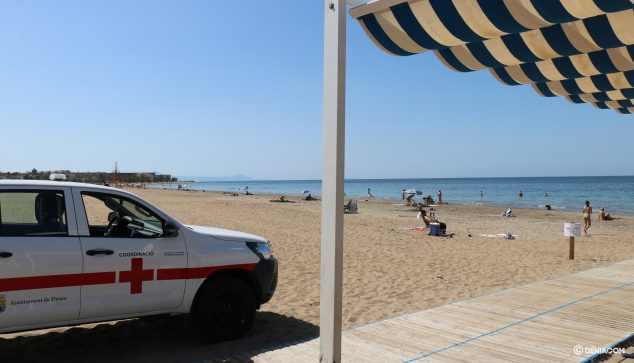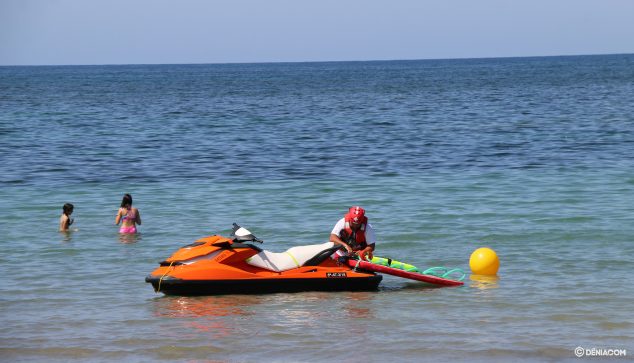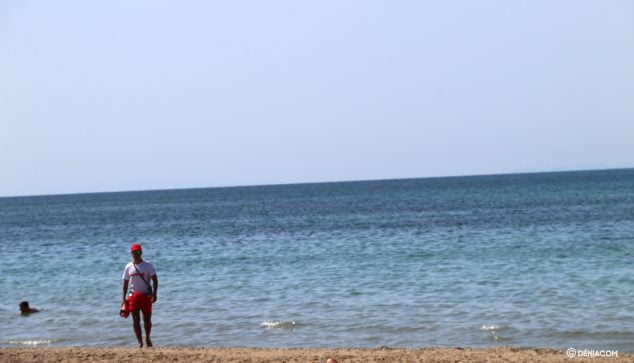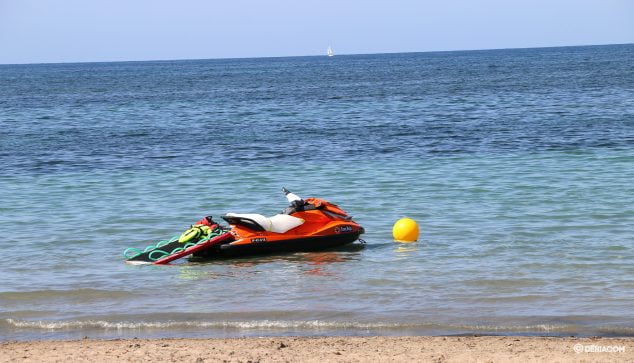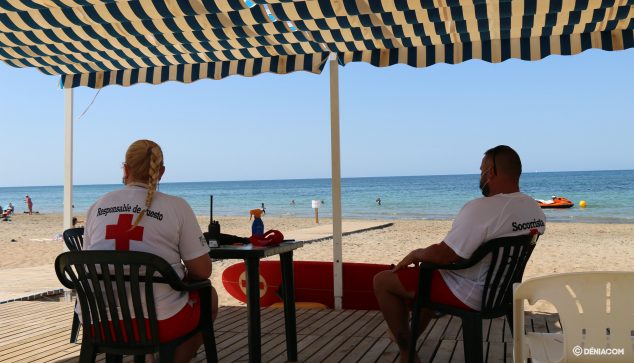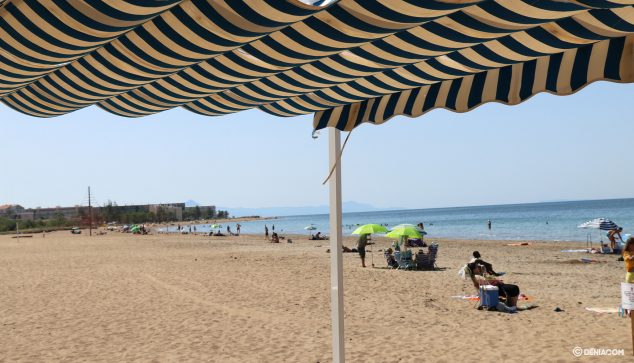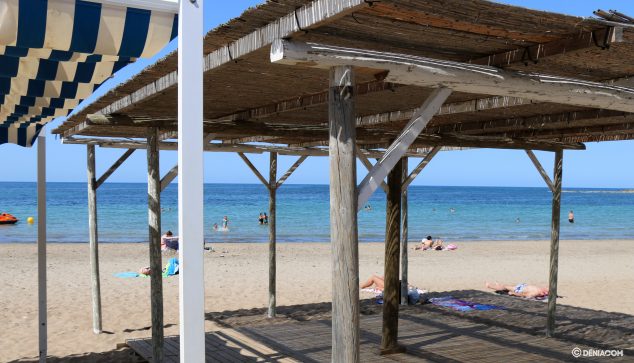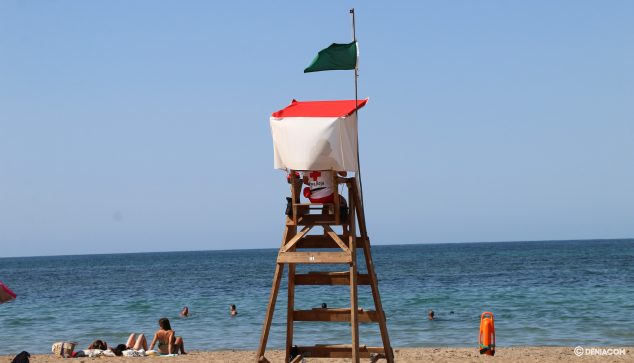Last Wednesday the high season started in the beaches of Dénia and with it the surveillance and relief service that Dénia Red Cross workers undertake every year was reinforced. The objective? Guarantee that on a geographically complex coastline like ours, with 20 kilometers of beaches, each one with its particularities, you can enjoy bathing in the safest way possible.
And this year, in addition, an extra obstacle must be added: the constant shadow of COVID-19. It will not be a season to use, of course. Whereas summers before were in the water where the main risks were, now also on land safety measures must be increased, perhaps more than anywhere else.
In addition, despite the fact that at first it seemed that 2020 would have a weak summer season, the first days of summer already show that attendance will be much higher than expected, with beaches that fill their capacity more limited than ever in just a couple of hours.
To find out how the extensive Red Cross team will face this unique season, we went to the guard post of Punta del Raset, where the coordinator of the Dianense coast service, Jordi Muñoz, welcomes us together with the lifeguards on that beach.
QUESTION. What has changed with the health crisis?
ANSWER. First responders carry a fanny pack with all PPE. They wear surgical masks, FPP2 masks to assist on the ground in case of something serious, they wear gloves, glasses and wear a gown.
CPR has changed, there will no longer be "word of mouth" as well as performance in the water. In other words, with active victims and victims with aquatic distress, conscious victims, attempts will be made to avoid contact with the person. You will be provided with the rescue can, to be picked up, and to be towed at a distance. However, in a passive victim there is no other technique that can be used, so we will have to expose ourselves since you can not go with the PPE swimming, or masks or gloves and, today, there are no PPE that can be used. use in water. There is nothing in the water.
Q. Of course, because if not, the option is to keep looking for the resource to arrive with the PPE, in this case boats, right?
R. Exactly, but here you can't. These are situations that force us to constantly wash and disinfect ourselves, and then control the possible symptoms that appear. Besides, we must take extreme precautions: more awareness of hand washing and a mask at all times to avoid possible contagion among rescuers. Because there is nothing stipulated. We keep track of the care we do, but it is impossible to do it for every contact between the lifeguards themselves or with bathers who only ask.
Q. In the case of ambulances, what measures are taken?
R. It depends on the performance it is. Yes, they will wear FPP2 masks, protective gloves, and if we can interact with the person and tell us that they have not had symptoms, they have not been isolated and they do not have any family member who has had COVID, they do a general interview and if we see who does not have a fever, we will not act “normal” without using the diver, only with the robes.
The gowns are the ones that the lifeguards have for a first intervention. They are for single use and quicker to install, so the reaction time will be less than with the safest equipment. We use the diver for severe assistance or CPR, whenever oxygen is used, with protective glasses, double glove and the FPP2 at the same time.
Q. And how is the transfer by boat?
R. When you are a conscious victim, we will provide you with a mask and help you to climb, always wearing protection. In drowned victims, on the motorcycle, there will be contact. What has changed is that before, the victim would lie face up on the board and the lifeguard would lie on top of his face down, like the one on the boat, to avoid having their faces together during the transfer. The rest does not change.
Of course, now if the person does not know if they have COVID or not, we treat it as a possible COVID, with disinfection and constant monitoring.
We also disinfect the boats every day in the port so that the next day they can safely pick them up again. The same thing happens with quads.
P. But what is most repeated in the day to day are not the rescues, but the light assists. How does it work with jellyfish, spider fish or wounds?
R. Assists are always done outside the post. The infirmary of the posts is now reserved only for serious assistance, because everything would have to be completely disinfected.
When there is a slight attendance, we invite users to wait while we give them a mask to put on and we invite them to wash their hands. When we have put on the PPE, we take out the material and attend to it outside.
During this year for prevention and after a study by the Institution in coordination with health agents, it has been agreed that the system of cures changes in such a way that if it is not a serious injury, the indication is that we provide the person with the material for its cure and as far as possible we do not touch the person. If it is serious, of course we act.
Q. What changes in the high season?
R. From July 1 to August 31 the number of resources and surveillance chairs increases.
Q. Has there been any change in the workforce due to the health crisis?
R. This year we have 12 awareness agents scattered around the beaches, who will report the regulations, the capacity, but cannot prohibit anything. They are informants. Whoever wants to breach, breaches.
We have 8 people a day to carry out the work of informing. One in Bovetes, one in Marines, one in Punta el Raset and we have two information points, one at the end of the port and the other at the Marineta Cassiana. There people can go to get advice or see where the beach walkers are or any other type of information.
En Les Rotes There will be another person at El Trampolí, another at El Fresquito and another at Ca Nano. It does not mean that they are fixed, but that they will be on the beach walking around informing.
If there is no capacity on the beach, they will notify you and offer safer alternatives.
They have training in first aid, but they are not going to dedicate themselves to assisting or monitoring, only to inform. Now, if something happens in front of them they would warn us to act.
Q. Is your work necessary?
R. In the short time that we are working in the surveillance service, I see it as very necessary. There are people who do maintain the regulations, but others who do not, either due to ignorance or stubbornness. There I do see that they are doing a very intense job of constantly informing.
Then we require the awareness of each person, because our job is only to inform the regulations so that they apply them. We cannot compel.
Without them we could not take on that job. He thinks that if the lifeguard who is watching the sheet of water apart has to be watching land, he loses watch over the water. The double function is not viable.
Q. How does the issue of gauging work?
R. It is very difficult to control when there is a full capacity. For example, in El Fresquito, the capacity is ten people and the police arrive with this exceeded. Who is failing? Who has come before? It is very difficult to act.
Q. When people communicate that the capacity is full, or do they see it upon arrival, do they turn around?
R. People at a general level are respecting the rules, they know that it is for their safety and that self-protection saves lives, therefore, when we warn, they usually decide to change the beach. There are always exceptions, but in those cases it is the responsibility of the security forces to act.
Q. And the new boundaries by areas on the beach are respected?
R. Mostly yes. On the sandy beaches they do respect him a lot as the agents are constantly reporting. Also, now that there is even less influx, you can see that people understand it.
In addition, it is something that was already similar. We have always left a space to walk and people stood behind. And just as he was trying to keep his distance, they didn't want to share a towel. However, there are areas such as Blay Beach and Les Rotes that are more crowded and the capacity is quickly filled.
Q. What will the assisted bathroom service be like?
R. We have a schedule to make an appointment, from 10:00 to 13:00, for the service that will be in July and August. Any user who wants to take a bath with assistance, be it an amphibian or a crutch, has to make the appointment. Without it the bath is not made.
The general rule is the same as always: you can only do the bath with a green flag. Of course, due to COVID the use of a mask will be mandatory and the user must be accompanied by two people, who will be in charge of giving the bathroom.
We will only be providers of the material, we will write down the data and we will disinfect it. The beaches that have the service will be Punta del Raset, Marineta and Bovetes.
We will divide the place of service into two zones. One that we will call the clean one that is where the material will be ready to be used, and the dirty one that is where it will be left once used for disinfection.
Q. How long does the Red Cross have the agreement?
R. In principle this year and a second more that will be an extension. We provide a preventive service that seeks to improve security. We believe that each year we create a service of higher quality and more focused on the prevention, awareness and awareness of the population, the aim of continuing to respond to social needs. Denia Red Cross has been providing this service for more than 30 years and we believe that we have a great professional background in service coverage and that we put all our efforts to respond to a changing reality.

